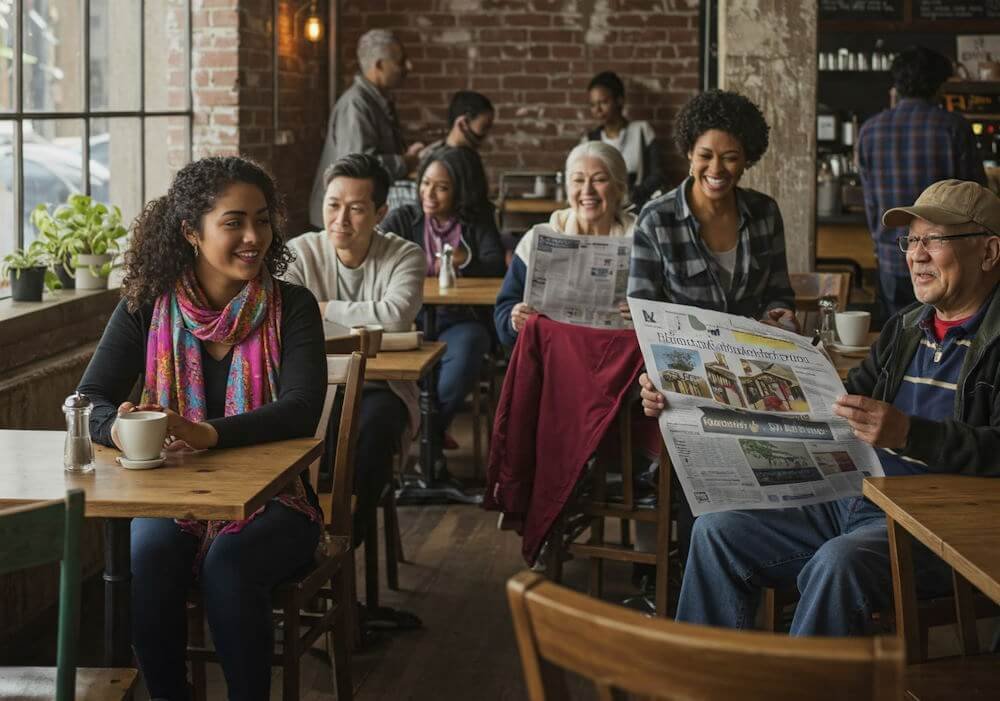The concept of café culture dates back centuries, with its roots tracing back to the Ottoman Empire in the 15th century. Cafés initially emerged as simple coffee houses where patrons gathered to enjoy a cup of coffee, engage in conversation, and share ideas. These establishments quickly evolved into important social spaces, serving as venues for cultural exchange, political dialogue, and artistic expression. The vibrancy of café culture is illustrated through its transformation over time, reflecting the dynamics of society and the evolving nature of community interaction.
In contemporary society, cafés have metamorphosed into multifaceted spaces that transcend the traditional role of merely serving beverages. They have become vibrant community hubs creating an inclusive atmosphere where individuals from diverse backgrounds come together. These establishments not only offer coffee and refreshments but also foster a sense of belonging and social engagement. Cafés often host events, such as open mic nights, art exhibitions, and book readings, further embedding themselves into the cultural fabric of both urban and rural life.
Moreover, the café culture emphasizes the importance of human connection. In a fast-paced world where digital interactions often overshadow face-to-face communication, cafés provide a sanctuary for meaningful conversations. Patrons gather around tables, engaging in discussions that contribute to their social experience and promote a sense of community. The physical space of cafés encourages this interaction, with comfortable seating arrangements and communal tables designed to facilitate conversation and collaboration.
As we delve deeper into the impact of cafés on community connections, it is essential to recognize their historical significance and the ongoing evolution of café culture. This exploration will shed light on how these establishments serve as catalysts for building relationships, fostering creativity, and nurturing a sense of belonging within various communities.
The Social Role of Cafés in Communities
Cafés have long been recognized as essential hubs for social interaction, serving multiple functions that enhance community cohesion. In essence, these establishments create inviting spaces where individuals can gather, converse, and form connections that may not occur in other settings. The ambiance of a café, characterized by its casual yet lively environment, encourages patrons to feel at ease, thereby facilitating a natural flow of communication. Whether it is through shared tables or the communal atmosphere fostered by baristas, cafés act as platforms that promote dialogue among strangers and friends alike.
Furthermore, the social role of cafés extends beyond simple interactions; they often become venues for the exchange of ideas and cultural discussions. Many local communities host book clubs, workshops, or discussion groups within cafés, allowing diverse topics to be explored in a friendly and supportive environment. This not only enriches the participants but also strengthens the fabric of the community, as individuals gain exposure to differing perspectives and experiences. Consequently, café-goers often leave with a sense of having contributed to a larger conversation, one that fosters inclusivity and open-mindedness.
Additionally, cafés serve as gathering spots for various demographics, uniting people from different backgrounds and walks of life. This unique ability to bridge social gaps makes cafés an invaluable asset to community identity. They not only provide a space for leisurely conversations but also act as venues for the celebration of local culture and events. By hosting art displays, live music, and themed nights, cafés actively engage with the community, making them a vital part of a neighborhood’s social fabric. Through these collaborative efforts, cafés cultivate an environment where connections flourish, reinforcing the notion of belonging and communal ties.
Cafés as Safe Spaces for Dialogue
Cafés have long been recognized not only for their role in serving beverages and food but also as essential spaces for social interaction and dialogue. These establishments provide a welcoming atmosphere that encourages patrons to gather, interact, and engage in conversations on a variety of topics. The casual setting of a café often leads to open and honest discussions, making them ideal environments for sharing diverse perspectives and facilitating dialogue about complex social issues.
One of the primary reasons cafés foster community connections is their ability to create a sense of safety for individuals to express their thoughts and opinions. In these relaxed environments, patrons are more likely to feel comfortable discussing sensitive topics, from local social issues to personal experiences. This comfort is beneficial for nurturing understanding and empathy among different community groups. By engaging in dialogue, individuals can learn from each other’s experiences, challenge their own viewpoints, and develop a deeper appreciation for diverse perspectives.
Cafés often serve as venues for organized events such as open mic nights, discussion panels, and book clubs, further enhancing their role as safe spaces for dialogue. These events provide platforms for various voices within the community, allowing participants to share their stories and insights in a supportive environment. Additionally, by attracting a mix of customers, cafés promote interaction among different demographics, facilitating broader conversations that might not occur in more segregated settings.
Moreover, the communal aspect of cafés encourages collaboration and the formation of networks among those who frequent them. This aspect can lead to partnerships between local organizations, advocacy groups, and individuals aiming to address pressing social issues. Overall, cafés embody a unique blend of comfort and openness, making them pivotal in fostering dialogue and understanding within communities.
Event Hosting and Community Engagement
Cafés have evolved into essential hubs for fostering community connections, particularly through the hosting of various events that encourage engagement among local residents. These establishments serve as a gathering place for individuals with shared interests, allowing for the exploration of diverse cultural expressions. Common events include book readings, poetry nights, live music performances, and educational workshops, all contributing to a vibrant community atmosphere.
Book readings, for instance, provide authors an opportunity to present their work while inviting the audience to participate in discussions. This interactive format not only aids in connecting authors with their readers but also encourages a culture of appreciation for literature within the community. Similarly, poetry nights elevate local voices, offering a platform for both seasoned poets and budding writers to share their art. Such evenings cultivate creative expression and foster a supportive network of writers and poetry enthusiasts.
Live music events further enhance the social fabric of cafés, allowing talented local musicians to perform while nurturing an appreciation for diverse musical genres. These gatherings serve not only to entertain but also to create camaraderie among attendees, as they often gather to share in the joy of live performances. Additionally, workshops hosted by cafés provide enriching learning experiences, ranging from cooking classes to artistic endeavors such as painting or crafting. Such events encourage skill development and stimulate networking opportunities, allowing residents to form connections based on mutual interests.
Overall, the role of cafés in hosting these communal events is significant. They provide a nurturing environment that promotes cultural expression, collaboration, and a sense of belonging among community members. As cafés continue to serve as focal points for local engagement, they play an invaluable role in fostering connections that enrich the community as a whole.
The Impact of Local Cafés on Economic Development
Local cafés play a vital role in the economic development of their neighborhoods, serving as hubs for community interaction and engagement. These establishments not only offer a unique atmosphere for socializing but also contribute significantly to the local economy by creating jobs, attracting tourists, and fostering local investment. Cafés, often seen as the heart of a community, facilitate connections among residents and visitors alike, leading to a vibrant economic landscape.
When a local café thrives, it generates employment opportunities within the community. These venues typically hire staff from the surrounding area, providing jobs that range from baristas to management roles. This local employment supports families and strengthens the community’s economic foundation. Furthermore, local cafés often source ingredients and supplies from regional producers, thereby promoting local businesses and keeping economic activity within the area.
In addition to job creation, thriving cafés can serve as popular tourist destinations. An inviting café atmosphere can draw visitors, eager to experience local culture through its offerings. This influx of visitors benefits not only the café itself but other nearby businesses, including shops, galleries, and entertainment venues, thereby creating a ripple effect that stimulates the local economy. Tourists are more likely to enjoy and share their experiences in the community, further enhancing its appeal.
Local investment is another essential aspect of this dynamic. Successful cafés can encourage other entrepreneurs to establish their businesses nearby, leading to more diverse offerings and increased foot traffic. This collaborative environment often results in a collective effort to improve the area, which creates a more attractive destination for potential residents and investors alike. By fostering a sense of community, local cafés contribute to a cycle of economic growth that benefits all stakeholders.
Cafés and Mental Health: Building Connections
Cafés have emerged as vital social hubs, offering more than just a place to enjoy a beverage; they serve as essential environments for fostering mental health and well-being. The experience of socializing in these communal spaces can significantly reduce feelings of loneliness and isolation, which are increasingly prevalent in today’s fast-paced world. Cafés provide an inviting atmosphere that encourages interaction, allowing individuals to meet new people and initiate meaningful conversations.
One of the psychological benefits of spending time in cafés is the opportunity to build support networks. Engaging with others in a relaxed and informal setting can create a sense of belonging, which is crucial for mental health. Regular visits to a café often lead to familiar faces and, subsequently, friendships. These connections contribute to a support system that can help individuals navigate life’s challenges. Furthermore, cafés can serve as a backdrop for community discussions and gatherings, enhancing the sense of camaraderie among attendees.
The ambiance of cafés plays a significant role in promoting mental well-being. The aroma of freshly brewed coffee, combined with the background chatter and soft music, creates a comforting environment that can alleviate stress. Individuals who frequent these establishments often report feelings of contentment and happiness, which can improve overall mental health. Moreover, the act of simply being around others can combat negative feelings associated with isolation, reinforcing the idea that one is not alone in their experiences.
Incorporating regular café visits into one’s routine can thus be a proactive measure for enhancing mental health. By facilitating social interactions and providing a sense of community, cafés not only elevate mood but also contribute to fostering long-lasting connections that hold the potential for improved psychological resilience. These communal spaces highlight the important interplay between socialization and mental wellness, underscoring the role of cafés in nurturing human connections.
Diversity and Inclusivity in Cafés
Cafés serve as vital community hubs, playing an essential role in fostering an atmosphere of diversity and inclusivity. By embracing a variety of cultural backgrounds, cafés can offer a welcoming environment that resonates with a wide array of patrons. The design and approach of the café can significantly influence how inclusive it feels to visitors. This includes considerations such as accessibility, seating arrangements, and décor that reflect various cultures. By representing different backgrounds, cafés not only showcase their commitment to inclusivity but also create a space where patrons can feel a sense of belonging.
The menu offerings at cafés further enhance their role in promoting diversity. By curating a diverse selection of food and beverages that cater to various dietary restrictions and cultural preferences, cafés signal their respect for different lifestyles. This includes not only vegan and vegetarian options but also products that reflect global cuisines. When individuals see their cultural identities represented in a café’s offerings, it fosters a rapport that enhances community bonding. Such considerations ensure that every visitor, regardless of their dietary choices or cultural background, feels valued and included.
Moreover, encouraging community events, such as open mics, art displays, or cultural celebrations, allows cafés to become platforms for diverse voices. By hosting events that highlight various cultural perspectives, cafés can nurture an environment of understanding and solidarity, inviting patrons to engage openly with one another. This aspect not only speeds up the social interaction among customers but also promotes cultural exchange, broadening the understanding of diversity within the community. Thus, cafés possess a unique opportunity to create inclusive spaces where all individuals recognize their contributions to the community fabric, allowing meaningful conversations to flourish.
Cafés as Cultural Exchange Centers
Cafés have historically acted as vital hubs for cultural exchange, providing a space for individuals from diverse backgrounds to share their unique experiences and perspectives. This phenomenon is particularly visible in urban environments where a melting pot of cultures often converges. The ambiance of a café—the inviting aroma of freshly brewed coffee, the sound of light conversation, and the visual appeal of art—creates a welcoming environment, encouraging patrons to explore and engage with various cultural traditions.
Throughout the world, cafés showcase an array of cuisines that reflect the locality’s cultural diversity. For example, a café may serve traditional pastries from one culture alongside an espresso made in the Italian style, creating an eclectic menu that celebrates culinary traditions. This gastronomic fusion not only tantalizes the taste buds but also fosters curiosity and appreciation for different heritage. By providing a space where diverse culinary practices are accessible, cafés serve as teaching platforms for patrons eager to learn about new cultural backgrounds.
Moreover, cafés often feature local artworks, music, and performances, transforming the space into a gallery of cultural expressions. They become venues for artists and musicians to exhibit their talents, allowing community members to experience various forms of artistic expression. This exposure encourages dialogue and deeper understanding among individuals from different walks of life, reminding patrons of their shared humanity while honoring their unique cultural identities.
As social spaces, cafés also facilitate dialogues on important social issues, allowing patrons to discuss topics that may affect their communities. This exchange of ideas is essential in fostering mutual respect and understanding, as it opens the door to shared experiences and empathetic connections. Ultimately, cafés enhance the communal fabric by serving as cultural exchange centers, making significant contributions to the broader understanding and appreciation of diversity in society.
The Future of Cafés in Community Building
As society continues to evolve in the wake of technological advancements and shifting lifestyles, the role of cafés in fostering community connections is poised to change significantly. Traditionally seen as meeting places, cafés have provided environments where individuals can come together, share ideas, and create bonds over coffee. However, as remote work becomes more prevalent and social interactions are increasingly facilitated online, the future of these establishments may require adaptation to remain significant in community building.
One potential evolution for cafés lies in the integration of technology. Establishments may incorporate digital platforms that enhance the in-person experience, such as offering interactive community boards or apps that facilitate networking among patrons. These tools could help create a sense of community even within digital interactions, allowing customers to engage with each other before and after their visits. By blending offline and online experiences, cafés can foster connections that transcend the limitations of virtual engagement.
Moreover, the décor, layout, and offerings of cafés could be reimagined to accommodate more community-oriented events, such as workshops, art displays, and literary readings. This shift could transform a typical coffee shop into a cultural hub that invites collaboration, creativity, and dialogue among diverse groups. By focusing on facilitating interactions—whether through hosting events or cultivating welcoming atmospheres—cafés have the potential to assert themselves as essential spaces for community engagement.
Furthermore, as consumer preferences evolve towards sustainability and local sourcing, cafés that prioritize these aspects will likely attract a more conscious clientele. By highlighting local art, food, and culture, these establishments can reinforce their roles as community connectors and champions of regional identity. Ultimately, the future of cafés in community building rests upon their ability to adapt and innovate, leveraging new technologies while staying true to their foundational purpose—serving as gathering places that enrich social connections.





